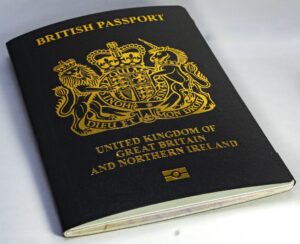
By Amber Bereznyckyj, History and Creative Writing student at the New College of the Humanities
The Nationality and Borders Bill (documented as HL Bill 82) has reached its second reading in the House of Lords. It is sponsored by Priti Patel and Baroness Williams of Trafford in the House of Lords. The lack of coverage of the bill and it’s equally controversial sister, the Police,Crime,Sentencing and Courts Bill has led many to question whether the government has been using the Christmas Party and No.11 house refurbishments as distractions to pass these newly amended bills.
The 2021 Nationality and Borders Bill is an amendment to the earlier British Nationality Act of 1981, which protected the rights of British Nationals born in Britain that have citizenship rights from their parent’s country of origin. It also protected a number of human rights established by the European Council, ensuring that only terrorists could become stateless. The new bill essentially revokes these clauses, some say due to the Shamima Begum situation, with the aim of fairer immigration by removing illegal immigrants and targeting traffickers. The Conservatives have continued to promise an Australian inspired points-based system and have defended the bill, arguing that the amendments could allow off-shore processing centres abroad as Australia does in Nauru and Papa New Guinea. However, this bill clearly does not succeed in its supposed aims. Instead it is increasing the imprisonment for illegal immigrants to twelve months and ‘any individual’ found helping asylum seekers from fourteen years to life. Seemingly establishing punishment over solution, the bill can easily be summarised as ‘you risked your life, not us, so why should we help?’
Here is a breakdown of the three most important amendments:
Clause 9 (5)
On revoking citizenship
The most controversial of the amendments, Clause 9, authorises the removal of citizenship without notice (and therefore without appeal) if it is not ‘reasonably practicable’ for national security, foreign policy or the public interest.
This breaks international law, specifically Article 16 of the 1951 Refugee Convention on ‘free access to courts’ and the right to a fair trial. Imagine doing your daily business and getting pulled over in your car for something as simple as a broken brake light only to be informed that you are stateless. Due to this bill, you could be hit with a fine, prison sentence or being made stateless because your great-grandparents came from another country a century ago. Then, because of Clause 9, you may not be given a chance to appeal because, as you don’t have to be notified, you may have unfortunately already passed the deadline to appeal. A petition currently available to get this clause removed is close to reaching 300,000 signatures.
Clause 10 (4)
On the rights of second generation minors (5-17yrs)
Originally, if a child born in the UK is born stateless, was a minor when they started the application and were in Britain when they started the application, they could be given citizenship. This is being amended to state that the child must not be able to ‘acquire another nationality’ somewhere else.
In theory, minors could be refused citizenship on the basis of their foreign heritage. This would cause issues for the child when they try to apply for educational institutions or are, in some situations, taken away from their parental guardians.

Clause 11
On the treatment of refugees
The amendments have fabricated two types of refugees. Group one is to be respected; group two is to be seen as unlawful. Someone is classed as being a group one refugee if they have come ‘directly’ from a life threatening situation and not crossed other safe countries beforehand. They must have reported themselves with no delay from a ‘designated place’, such as a port, removal centre or authorised authority. Refugees categorised as group two if they have crossed multiple safe countries, have right to citizenship elsewhere or have not declared themselves at a designated place. This includes individuals in refugee camps awaiting transport in locations such as Calais and those who find themselves in life-threatening situations at sea. If they are group two, the refugee and their family can be denied public funds, increased requirements to apply, fined, imprisoned or even left out at sea as the bill gives Border Force officials the power to turn away refugees while in the English Channel.
The Government website states that this measure to turn away refugees is to send a ‘clear message’ to immigrants not to make the ‘dangerous and illegal’ journey after 4,470 refugees died making the trip in 2021. However, the UN has rightly warned Priti Patel for her contribution to this clause, as she did not inform the UNHCR. They explain that as Home Secretary, she is breaking international law – namely Article 31 of the Geneva Convention which protects refugees from sanctions for entering a host country illegally. Furthermore, by turning away refugees at sea, the government would essentially be purposefully leaving them to die, thus also breaching Article 2 of the European Convention of Human Rights on ‘intentionally’ depriving someone of their life. After this confrontation, the Nationality and Borders Bill was updated with this reassurance: ‘Baroness Williams of Trafford has made the following statement under section 19(1)(a) of the Human Rights Act 1998: In my view the provisions of the Nationality and Borders Bill are compatible with the Convention rights’. As a sponsor, of course the Conservative Baroness Williams would support the bill further however it is questionable to update the bill and the Human Rights Act with a mere comment to add authority. Even the sub-categorisation between refugees into group one and two creates a form of second-class citizenship and is far too simplified not to have an immoral impact.
The bill later continues to defend its lawfulness by reasserting that the amendments are still in line with Article 3 of the Human Rights Convention, which obliges signatories not to turn away refugees if their state or secondary states ‘threaten’ the life and liberty of that person, concerning their race, political or religious belief, gender or sexual orientation. Despite this, it concedes that this is why the bill gives the Secretary of State the power to deport any immigrant – or other generation of the family – to a ‘safe third state’. It goes on to say that this does not ‘prevent’ the Secretary of State from deporting someone to ‘any other’ safe state either.
This means that British Citizens and refugees could be deported to a state where they do not know the language and to which have no deep connection to other than heritage though the bill does establish that these ‘safe states’ are ‘third world’; not Britain’s European neighbours such as France. This amendment therefore. could not encourage conflict between Britain’s closest allies however it still creates reasonable tension for the UK’s foreign policy when confronted by the UN.

Contributor to The London Financial
We combine research produced by students and early professionals into a single website, breaking down the barriers to entry individuals face in a number of industries.
Contributor opinions are their own and do not necessarily reflect the stance of the LF.
There is one failing streak that runs through journalist integrity when you write about the nationality and borders bill. You and others select the most controversial sensational clauses and totally ignore the good clauses 1 to 8 that will rectify generations of hurtful demeaning discrimination towards black children of British overseas parents descent. Discrimination based on birth status, parents lack of marital status, gender discriminations. Is it to much to ask for telling of the complete fair balanced story?